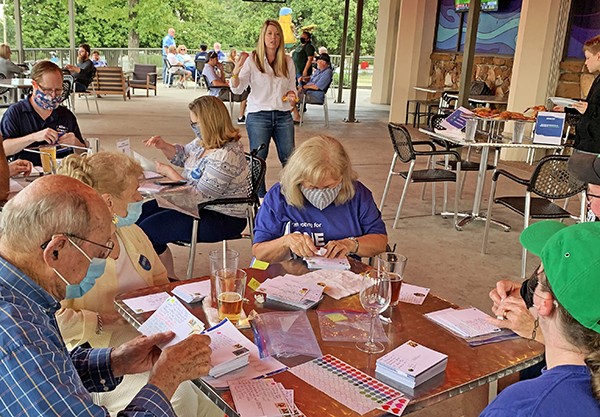For a time, it seemed that there would be one major statewide political debate this year — for U.S. Senate candidates — to be held under the auspices of the NEXSTAR network, which includes WREG-TV News Channel 3, locally.
The debate was scheduled for Wednesday, October 14th, in the studios of WKRN in Nashville.
The NEXSTAR invitation to participants cited a lengthy list of prerequisites, including one that candidates “must have reported, on the most recent official forms filed with the appropriate election authority, accepting at least $50,000 in monetary, as opposed to in-kind, campaign contributions, at least 25 percent of which must be raised from in-state constituents.”
Clearly, Republican Senate nominee Bill Hagerty, who reported upwards of $12 million in receipts on his last filing, in July, easily qualified. Surprise Democratic nominee Marquita Bradshaw of Memphis had reported contributions in the neighborhood of $22,000 as of that reporting date, though presumably she has raised considerably more than $50,000 since, and would have filed reports indicating as much, and would also have qualified to take part in the debate.
 Jackson Baker
Jackson Baker
Reflecting a confidence that the U.S. Postal Service is equal to the task, District 83 state House candidate Jerri Green oversees a postcard-writing party.
Nobody else was even close to the $50,000 threshold. That would include another Memphis candidate, Aaron James, one of nine independents running. Responding to WKRN general manager Tracey Rogers, James cited a Federal Communications Commission (FCC) regulation requiring that “if a station allows a legally qualified candidate for any public office to use its facilities … it must give equal opportunities to all other candidates for that office to also use the station,” contending also that “the minimum bar for being recognized as an official candidate by the Federal Election Commission is only $5,000.”
Therefore, said James, given the strictures of the two cited federal commissions, he had a right to insist on inclusion; he maintains that he has a campaign fund of at least $5,000, consisting of his own money, and he filed an informal complaint this week regarding his exclusion from the debate.
Then the whole matter has become moot. Rogers announced that the debate event had been called off, and viewers in Memphis and elsewhere in the state will not, after all, have an opportunity to witness an exchange between major-party candidates Hagerty and Bradshaw, much less one involving James or any of the other eight independent candidates.
Bradshaw engaged in an interesting exchange of another kind last week with state Democratic chair Mary Mancini. In an online interview, the Democratic nominee, largely an unknown statewide but a familiar presence in environmentalist ranks, gave this account of her coming of political age:
“Right across the street from my elementary school was a Superfund site. And we didn’t learn about the dangers of this Superfund site until it closed down in 1995. … [T]hat was the year that I gave birth to my son, at the age of 21. I watched my great grandmother die of cancer. And after she died, many people in the community began experiencing sickness and death, also at alarming rates higher than the national average. And so that was when I got involved in a political process beyond voting.”
• In these pandemic times, the number of public assemblies of any kind has been drastically reduced. But on Monday night, there were doubtless many people who wanted to take part in two simultaneous events and had to choose. One was a memorial service at the D’Army Bailey Shelby County Courthouse in honor of the late Supreme Court Justice Ruth Bader Ginsburg. Organized by Assistant County Attorney Jessica Indingaro, it drew numerous legal and political eminences.
Simultaneously, members of the Coalition Get Out the Vote 901 group, including some key Democrats, were participating in a Zoom meeting, co-hosted by state Senator Raumesh Akbari and TaJuan Stout-Mitchell, to discuss pre-election strategies.
In it, local Democratic Party chair Michael Harris cited District Attorney General Amy Weirich as a target for defeat. That’s called looking ahead. Weirich isn’t up for re-election until 2022.

